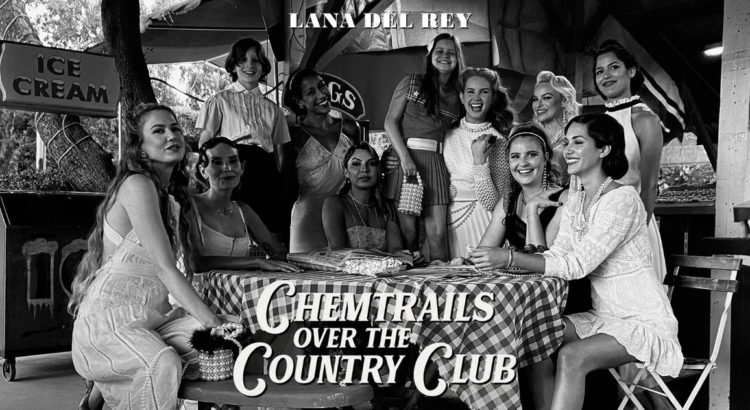Two days after the album’s release, I can finally pull myself from my folk-Americana-alt-indie haze to write a coherent review of Chemtrails Over the Country Club— Lana Del Rey’s sixth studio album. To say I was dubious that this album could come close to her last work, the masterpiece that was Normal F*cking Rockwell (NFR), would be an understatement; when I first hit play on Chemtrails, I expected to be disappointed. Lana has a beautiful voice and can write successful songs, but her subject matter and music tends to stay in one wheelhouse; mix Hollywood glamor and greed with older men and despair, and you have a Lana song— probably one that I’m going to like. Still, what I really had been wanting from her was something new, and I got that on NFR as she reigned in her voice and subject matter so that the melodrama became a bit more authentic. I loved that album; it gave us a more personal sound that made me wonder if she had peaked. I mean, after NFR, after “Happiness is a butterfly” … what else was left to say?
Evidently, there was plenty. On Chemtrails, she expanded upon that sound, adding elements I never thought I would hear on a track by Lana Del Rey, while stripping away elements I had come to expect. Covering Joni Mitchell, paying homage to American folk, and featuring country singers, Lana has taken her devotion to Americana to new levels on Chemtrails, combining her love for Hollywood with a love of something else that is distinctly American: country music.
When I say country, I mean old school country, rooted in blues and American folk. Lana’s past music has occasionally been bluesy, with elements of jazz, but stringy acoustic guitar and brass instruments are usually not something I would expect from her. Yet, in “Dance Till We Die,” she belts to a heavy beat against a saxophone and some bluesy guitar. It’s definitely one of the best moments on the album, and thankfully, this record no longer uses whatever weird vocal effect her old music used to have that made it sound as though she was singing on a 1950s microphone. Instead, her voice sounds clear and controlled, a definite improvement.
Another standout is “Not All Who Wander are Lost,” which, once you hit the chorus, sounds absolutely nothing like a Lana Del Rey Song. It’s hopeful, and happier than 90% of her music, with beautiful harmonies that I can only guess come from producer Jack Antonoff, who’s known for using grand instrumental buildups. I can also hear his hand in its twangy guitar interlude and closing solo, which, again, are not things I would expect on a Lana track. Lana first brought Antonoff on for NFW, and I think we partially have him to thank for the slightly less performative, more confessional style on some of her newer songs.
Something I also really appreciated were features of other artists. “Breaking up Slowly” features “outlaw country” artist Nikki Lane, and Lana also brings in Zella Day and Weyes Blood to cover Joni Mitchell’s “For Free.” It transforms into something beautiful and orchestral… something in which Antonoff surely had a part.
There are some songs that sound more like classic Lana, like “White Dress” and “Chemtrails over the Country Club,” which I was able to appreciate in contrast to some of the other songs. “Wild at Heart” strikes a really nice balance between old Lana and this new sound. It’s a beautiful triumph that, at times, even reminds me of Tammy Wynette (who is referenced in “Breaking Up Slowly”) and other classic old country, while still feeling like Lana. “Dark But Just a Game” is another song that really blends the old Lana with the new, sounding like Born to Die and Ultraviolence, at parts, while still feeling more confessional and raw than the music of her past. I think that balance is crucial, because other songs, like “Let Me Love You Like a Woman,” that feel straight off Ultraviolence or Honeymoon are definitely the weakest for me. I guess I’ve just heard her do that type of song before, and I’ve heard her do it better. I would leave that sound in the past.
Overall, though, I am surprised to say: I love this album. It delves into a side I didn’t know Lana had. I like that it plays into other parts of American music, because American culture has always been a big part of Lana’s subject matter, but now she’s using that in a new way. She references many other artists in her lyrics, including Joni Mitchell, Tammy Wynette, and Kings of Leon, nodding to the new folk and country elements this album brings in, and, of course, the rock upon which she has always depended.
So, in conclusion, is it better than Normal F*cking Rockwell? Well, I haven’t decided yet. But the fact that I have to ask that question at all is an incredibly good sign.


